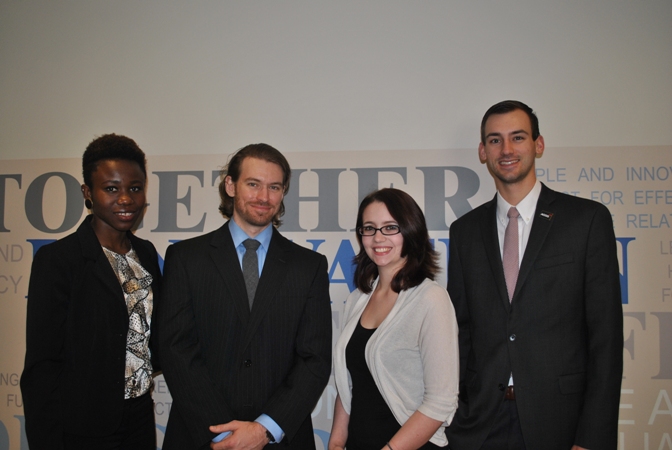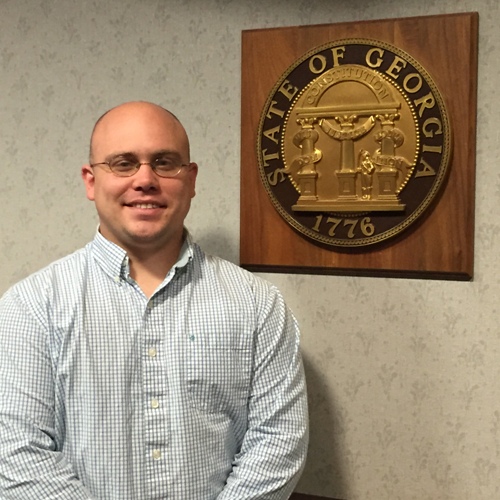
| February 2016, Vol.10, No.2 | Past issues | Subscribe | Printer Friendly | Advertise | eMagazine Archives |
 From left to right: Mantin Diomande, Aaron McClellan, Sierra Hubbard, and Chad Cox
Chad Cox, one of two policy interns, is a graduate of Georgia State University with a degree in political science. Cox plans on attending graduate school this upcoming fall to pursue a masters of public administration. A Georgia native, Cox was born and raised in Gwinnett County. His hobbies include golf, water skiing and attending country music concerts. Over the course of his internship, Cox will help track local legislation, research local animal control ordinances and weight limits on trucks, attend meetings and assist the policy staff as needed.
Mantin Diomande, policy intern, is currently completing her Master’s in Economics at Georgia State University. Upon completing her master’s, Diomande plans to pursue a Ph.D in Economics. She is originally from Cote d’Ivoire, a French speaking country in West Africa. Diomande has a strong interest in issues related to economic development and policy and in her spare time enjoys outdoor activities and adventures. During her internship, Diomande will assist the policy staff by tracking local legislation, researching revenue and finance issues, attending meetings and completing additional tasks as assigned.
Sierra Hubbard will serve as the spring communications intern. She is a junior at Kennesaw State University and is earning her bachelor’s degree in communication and journalism. Living the majority of her life in the Paulding County area, she immediately began writing for the campus newspaper when she enrolled at KSU in 2013. She is the current news editor for the third semester in a row, managing writers and content on a weekly basis. During her internship, Hubbard will disseminate the daily state and county news highlights internally, update the website, and manage the association’s social media accounts. She will also edit and create content for several projects, including the Georgia County Government magazine, the annual awards supplement, the launch of the "County Courthouse Passport" booklet and the new "How to be a County Commissioner" booklet, regular press releases, and any other aspects of the communication department as needed. Aaron McClellan, legal intern, is currently a second-year law student at Georgia State University College of Law. Originally from Wisconsin, McClellan moved to Knoxville, Tennessee where he completed his bachelor’s degree in Civil & Environmental Engineering. After graduation, he worked as a structural engineer in Marietta for nearly a year before starting his law degree at Georgia State. He is currently enrolled in the Urban Fellows Program and hopes to practice law related to land use and government policy after graduation. Before and during school, McClellan made a living as a carpenter with a specialty in framing for over ten years. In his spare time, he enjoys spending time with his wife and playing bass guitar. During his internship with ACCG, McClellan will assist the legal staff by verifying and updating legal citations for several ACCG publications, preparing memoranda and summaries on a variety of topics for the association, updating local legislation salary information, attending meetings and providing general legal research.
Audits Begin for Workers’ Compensation Program
Few words make one anxious on the spot like the word "AUDIT." But ACCG continues to make the process of annual payroll audits, which begin in February, as painless as possible. ACCG recently hired a dedicated payroll auditor with Georgia county experience for the insurance program. Lisa Wood, formerly with Affinity Service Group, has conducted 40 percent of the audits for the ACCG Workers’ Compensation Program (ACCG-GSIWCF) over the past nine years.
"In the years I have conducted payroll audits, I have noticed the word ‘audit’ bring out a range of emotions including fear, nervousness and intimidation. I have worked with members over the years to ease those fears. Members already have the information we need, so it is just a matter of pulling the records," said Wood. "We are here to assist them with proper classification, so they are charged the correct premium for their risks. For example, we may be given the entire budgeted payroll for the sheriff’s office which includes the clerical staff, but we move the clerical payroll to the lower rated clerical class code vs. the higher rated law enforcement code."
Why is an audit even necessary? Why do members sometimes receive another invoice for the same policy period? All workers’ compensation insurance premiums are originally based on estimated payroll by class(ification) code by employee, which is provided by the insured organization. Each class code has its own rate based on the risk associated with the job duties being performed, so it is very important that employees are properly classified. Rates are applied per $100 of remuneration. This is where your initial premium is determined, and then other factors are applied, such as volume discounts, safety discounts, claims experience discounts or charges, and deductible credits (where applicable).
After the policy period ends, a payroll audit is conducted to verify the actual wages paid to all employees and to verify employees are properly classified based on their job description and exposure. For overtime wages, a reduction for the half or double time wage paid is applied, so only the wages paid at regular time wage are included in the calculation.
The 1099s for payments to subcontractors are also reviewed as well as certificates of insurance evidencing their own workers’ compensation coverage. If the subcontractor is uninsured and performs regular or recurring services for the county, these subcontractors may be picked up on audit based on the information provided to the auditor. If these uninsured subcontractors were not included in the estimated payroll figures, this would generate an additional premium.
If the county has a resolution to provide workers’ compensation coverage for volunteers, the volunteers on the audit are based on the rosters provided that list each active volunteer for the policy period. Depending on the estimated number of volunteers for the policy period, versus the actual number of volunteers provided by roster, this could generate a change in the premium. Therefore, it is important to keep your volunteer rosters up-to-date with only active volunteers.
Once determined by the auditor, the actual payroll by class code is used to calculate the final premium for the prior year. That is compared to the estimated premium to determine if there will be a balance due invoice or a refund.
It may be challenging for a staff person to accurately estimate the payrolls when they are due to the ACCG in September for the following calendar year. It is difficult to accurately predict overtime, mid-year raises, added employees, uninsured subcontractors and changes in volunteer rosters. That is why an audit is necessary for workers’ compensation. It is also necessary to assure proper rates are being charged and collected for the risks being covered so that premiums are equitable by member.
The ACCG – Group Self-Insurance Workers’ Compensation Fund (GSIWCF) is a member-owned fund, so know that the ACCG staff is here to help. Please contact Lisa Wood with any questions or concerns about the payroll audit process or the results of your audit. She can be reached at 404.308.5760 (cell) or lwood@accg.org.
Georgia State University College of Law Student, Daniel Richardson, Interns with Fayette County State Court
 Prior to his internship with State Court Judge Jason Thompson, Richardson’s experience with the court system was limited to his service on jury duty. Through his internship, he learned about the day-to-day operations of state court and the interactions that office had with the solicitor and public defenders.
Richardson’s intern responsibilities kept him focused on preparing orders for both civil and criminal cases. To successfully prepare these orders, he sat in on and listened to recorded hearings, performed legal research, and sought the input of the county staff attorney and Judge Thompson. Richardson also prepared memos on legal questions, including summarizing the effects of newly enacted Georgia legislation. He felt that this exposure to the courtroom and legal research and writing outside his legal studies was an important step in becoming a well-educated lawyer.
When asked about his most noteworthy successes, Richardson stated that he was able to complete orders on a number of significant cases which helped to clear the court’s docket. However, he was most proud of the legal research that he provided on a case involving a challenge to the constitutionality of a Georgia statute which ultimately led the judge to go in a different direction than he was originally inclined.
Richardson’s favorite part of the internship was the opportunity to observe a wide variety of court proceedings, many of which he was unfamiliar with prior to this experience. His observations not only taught Richardson about court procedure but it also taught him about courtroom strategy. From being able to see the behind-the-scenes deliberation process for the judge and his staff to learning how not to conduct yourself in court, the ability to observe provided him with a unique chance to see how to be an effective attorney when appearing in court.
After graduating from law school, Richardson plans to work as an assistant district attorney. When asked about how his internship prepared him for future endeavors, he replied, "This internship has provided the real-life experience and exposure to the courtroom that I have needed to supplement my academic studies, and I think it will be invaluable moving forward in my career."
For more information on the GCIP, please visit the ACCG Civic Affairs Foundation website at www.civicaffairs.org.
|
| ACCG, Georgia's County Association 191 Peachtree Street NE, Suite 700 Atlanta, GA 30303 phone: 404-522-5022 | fax: 404-525-2477 | ACCG.org |

